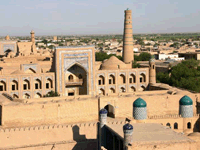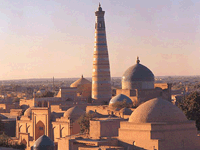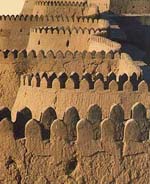 | KHIVA History
of Khorezm dates so long back to ancient times that only few civilizations can
equal its age. Hundred years before opening of the Great Silk Road the ancient
Khorezm was already connected by water and land with Europe and East, Siberia
and the civilizations of the South. The great world civilizations of the time
merged in Khorezm. Their cultural interaction preceded the opening of the Great
Silk Road.
Khiva is placed in the west of Khorezm region, at an altitude of
100 m above sea level, near boundless Kyzilkum Desert. Khiva seems to have been
materialized from a fairy tale. It keeps the exotic character of ancient place,
untouched by the time till present days. There are palaces with reach mosaics,
unique beautiful minarets, medressas and mosques there. The architecture of Khiva
amazes by its monumental, picturesque, and astonishing combinations of colors.
 Alloquli
Khan Medressa and Carvonsaroy Alloquli
Khan Medressa and Carvonsaroy
The street leading to the opposite place
of Oq Mosque encompasses some attractive buildings, majority of which were built
by Khan Alloquli in 1830 and 1840. The first edifice is a high Alloquli Khan Medressa
(1835), as well as Kutlimurodinok Medressa (1809) of an earlier period facing
each other in that street. Facades are decorated with ceramic bar. Alloqulikhan
Market and Karvonsaroy, the north of Alloqulikhan Medressa, were erected the same
year as medressa itself. There is a high wooden gate before medressa at the entrance
of karvonsaroy and the market. The market is an arcade with a dome. karvonsaroy
is a department store nowadays, it is easy to buy cheap ceramics there.
 Islom
- Huja Medressa & Minaret Islom
- Huja Medressa & Minaret
Islom-Huja Medressa and Minaret are the
modern Islamic monuments of Khiva, both built in 1910. The 45-meter minaret surrounded
with turquoise and red ceramic bars, more likely, looks as an extraordinarily
beautiful beacon. It is the highest minaret with 118 footsteps opening up the
wonderful scenery of desert Karakum.
The best applied art museum of Khiva in
the medressa keeps ancient woodcarving, metal products, jewelry ornaments, books,
Uzbek and Turkmen carpets, pottery, Arabic type stone carvings (Khorezm residents
used to read and write on them during 8-20th centuries) and huge pots referred
as khum to store food underground.
 Ichon-Qala
Walls & Gates Ichon-Qala
Walls & Gates
Main entrance to the Ichon-Qala is a twin-turreted brick
Western Gate (Ota-Darvoza or "Father Gate"). The scenic 2.5-kilometer
mud wall was built in the 18th century, and was restored after Persians destroyed
it. The northwest part has almost been completely restored in recent ten years.
These walls have Northern, Eastern and Southern Gates as follows: Bukhoro Darvoza
(Bukhara Gate), Polvon Darvoza (Strong Man's Gate) and Tosh Darvoza (Stone Gate),
and there are additional 40 bastions.
|  |